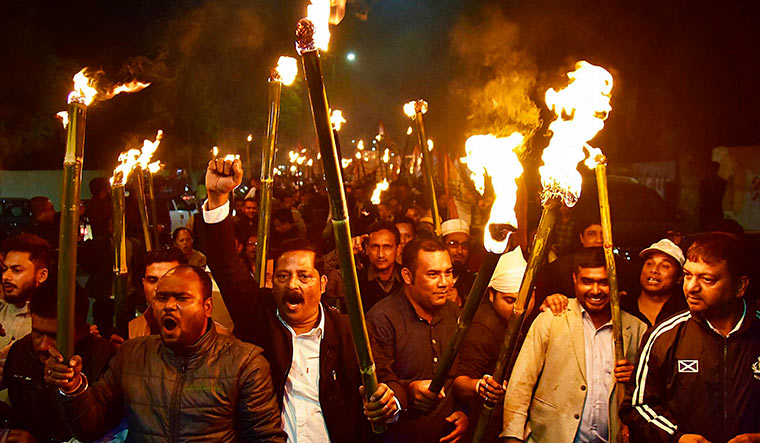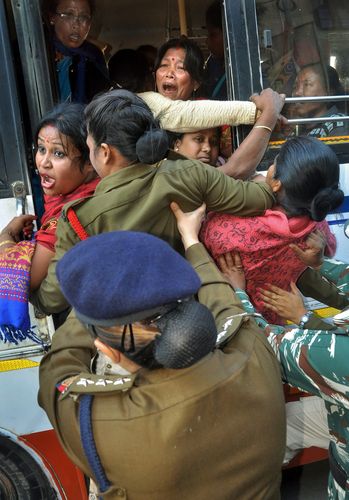ON JANUARY 3, Prime Minister Narendra Modi was in Silchar, his second stop for the day in the northeast, as he launched the BJP’s campaign for the upcoming Lok Sabha elections. Silchar is a small town in upper Assam, inhabited largely by refugees who came from Bangladesh in 1947 and during the 1971 war.
Addressing a rally in Silchar, Modi announced that his government would try and pass the Citizenship (Amendment) Bill, 2016, immediately. It would confer citizenship to Buddhists, Jains, Sikhs, Christians and other non-Muslims from Bangladesh, Afghanistan and Pakistan, whose names were missing from the National Register of Citizens (NRC) in Assam. After the NRC’s latest revision, nearly 40 lakh people were left out, of which six lakh were from Silchar.
Following Modi’s announcement, the Asom Gana Parishad, a member of the National Democratic Alliance, announced its decision to pull out of the coalition government in Assam. The AGP said it did not expect Modi to make such a crucial announcement even before the joint parliamentary committee had submitted its report. AGP president Atul Bora said his party was leaving the coalition. “We thought the prime minister would not act in haste,” he said. “I had met the prime minister and the home minister several times. They assured us that they would look into the issue. But they stabbed us in the back.”
The AGP came to power in the 1980s, riding on the support of the indigenous people of Assam. AGP founder Prafulla Kumar Mahanta signed the Assam Accord in 1985, which brought peace to the ethnically-torn Assam. Under the accord, all illegal immigrants from Bangladesh who entered India after March 1971 were to be sent back. The accord called for the setting up of an NRC in Assam. The AGP and its allies are angry that the new bill is against the letter and spirit of the accord.
Mahanta called the bill a total violation of the accord. “The Central government wants to kill the accord by protecting Hindus coming from other countries. Assam will not accept it,” he said. The AGP, the All Assam Students Union and the Krishak Mukti Sangram Samiti staged a nude protest on January 7 in Delhi against the bill. AASU said it would shut down the entire northeast. “We will not be silent,” warned AASU mentor Samujjal Bhattacharya. “The bill contradicts the Assam Accord and hampers the NRC process which has been going on at the instruction of the Supreme Court.”
Violence erupted in Assam and other parts of the northeast during the day-long bandh called by AASU and the North East Students Union on January 8. At Golaghat in Assam, angry protesters destroyed the BJP office. They also torched the portrait of former prime minister Atal Bihari Vajpayee. Except for Tripura, Arunachal Pradesh and Sikkim, the northeast was shut down completely. Nagaland and Meghalaya asked Modi not to go ahead with the legislation. “We will have to rethink our ties with the BJP if it passes the bill,” said Meghalaya Chief Minister Conrad Sangma.
The issue has put Assam Chief Minister Sarbananda Sonowal in a tight spot. Sonowal rose to political prominence by harping on illegal immigration and NRC. He had approached the Supreme Court for setting up the NRC. Sonowal is now being forced to dramatically reverse his stand on the issue. Despite the AGP pulling out, the Sonowal government does not face any immediate threat. The BJP has 60 MLAs in the 126-member house, and it can stay in power with the support of the Bodo Liberation Front, which has 12 MLAs. But the AGP’s decision will upset BJP president Amit Shah’s calculations to win 22 of 25 seats in the northeast in the next Lok Sabha elections.
The Congress sees an opportunity in the rift between the AGP and the BJP. Congress leader and former chief minister Tarun Gogoi said his party might consider an alliance with the AGP, if it severed its ties with the BJP. “All anti-BJP forces are welcome to join us. Our main objective is to defeat the BJP in 2019,” said Gogoi. The Congress, however, is worried that opposing the bill would have larger ramifications in the rest of the country as it could get branded anti-Hindu.
Bhattacharya said there was no need to distinguish between Hindus and Muslims while dealing with illegal immigrants. “They all should leave Assam. We have suffered for many decades. Now it is time for us to get justice,” he said. Bhattacharya also blamed the JPC for not listening to stakeholders in the northeast. “The JPC came to Assam only once,” said Bhattacharya. “We then requested them to visit the northeast extensively to understand why the bill was against the region. But they never visited the region again.”
Bhattacharya said opposition parties including the Congress, the Trinamool Congress and the Telugu Desam Party did not give any support. The only parties that promised support were BJP allies Shiv Sena and Janata Dal (United).
The BJP is nevertheless going ahead. On January 8, Home Minister Rajnath Singh moved the bill in the Lok Sabha. After the speaker refused to send it to the select committee, the Lok Sabha approved the bill. The government hopes that the bill will help expand the citizenship question to other states such as West Bengal, Bihar and Jharkhand. According to the Union home ministry, there are nearly 1.5 crore illegal immigrants in the country and about 30 per cent of them are non-Muslims. With the new bill, the Central government expects to carry out a survey of illegal immigrants in other states, which would give an exact picture of the situation. “So, even if the government is unable to have NRCs in states like West Bengal, the survey would allow it to have an assessment of the number of persecuted non-Muslims in the states,” said Biswapriya Roychowdhury, senior BJP leader from West Bengal. He said the BJP was keen to deport Bangladeshi infiltrators in West Bengal, where the party has been actively wooing the Hindu refugee group Matua, which has nearly a million members.
The communal angle is quite evident in Assam as well. Senior cabinet minister Himanta Biswa Sarma said the BJP was pushing ahead with the citizenship bill to prevent a large number of constituencies in Assam from getting dominated by Muslims. “Then you will see no more Hindu chief ministers in Assam,” said Sarma. “Without the bill, we are surrendering to the philosophy of Jinnah.... This is a fight between Jinnah’s legacy and India’s legacy.”



